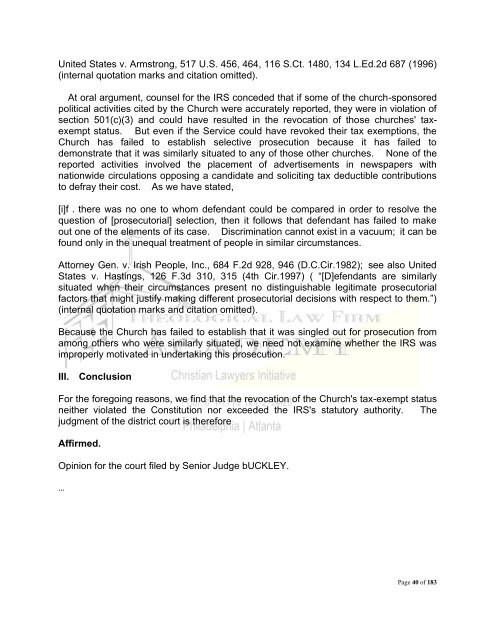The 508(c)(1)(a) Initiative Workshop
The 508(c)(1)(a) Initiative Workshop
The 508(c)(1)(a) Initiative Workshop
Create successful ePaper yourself
Turn your PDF publications into a flip-book with our unique Google optimized e-Paper software.
United States v. Armstrong, 517 U.S. 456, 464, 116 S.Ct. 1480, 134 L.Ed.2d 687 (1996)<br />
(internal quotation marks and citation omitted).<br />
At oral argument, counsel for the IRS conceded that if some of the church-sponsored<br />
political activities cited by the Church were accurately reported, they were in violation of<br />
section 501(c)(3) and could have resulted in the revocation of those churches' taxexempt<br />
status. But even if the Service could have revoked their tax exemptions, the<br />
Church has failed to establish selective prosecution because it has failed to<br />
demonstrate that it was similarly situated to any of those other churches. None of the<br />
reported activities involved the placement of advertisements in newspapers with<br />
nationwide circulations opposing a candidate and soliciting tax deductible contributions<br />
to defray their cost. As we have stated,<br />
[i]f ․ there was no one to whom defendant could be compared in order to resolve the<br />
question of [prosecutorial] selection, then it follows that defendant has failed to make<br />
out one of the elements of its case. Discrimination cannot exist in a vacuum; it can be<br />
found only in the unequal treatment of people in similar circumstances.<br />
Attorney Gen. v. Irish People, Inc., 684 F.2d 928, 946 (D.C.Cir.1982); see also United<br />
States v. Hastings, 126 F.3d 310, 315 (4th Cir.1997) ( “[D]efendants are similarly<br />
situated when their circumstances present no distinguishable legitimate prosecutorial<br />
factors that might justify making different prosecutorial decisions with respect to them.”)<br />
(internal quotation marks and citation omitted).<br />
Because the Church has failed to establish that it was singled out for prosecution from<br />
among others who were similarly situated, we need not examine whether the IRS was<br />
improperly motivated in undertaking this prosecution.<br />
III. Conclusion<br />
For the foregoing reasons, we find that the revocation of the Church's tax-exempt status<br />
neither violated the Constitution nor exceeded the IRS's statutory authority. <strong>The</strong><br />
judgment of the district court is therefore<br />
Affirmed.<br />
Opinion for the court filed by Senior Judge bUCKLEY.<br />
…<br />
Page 40 of 183
















